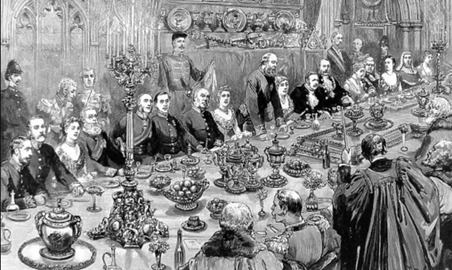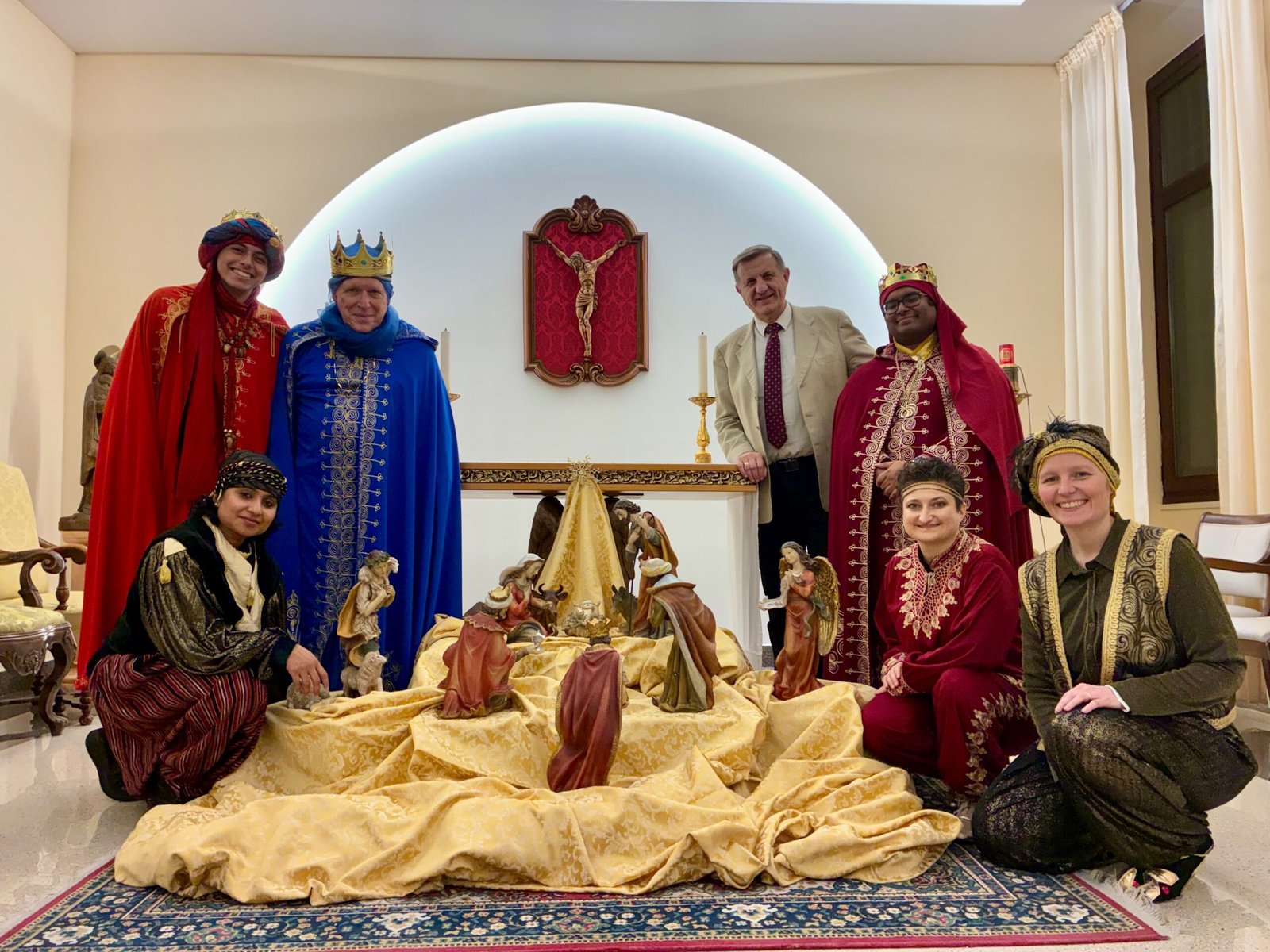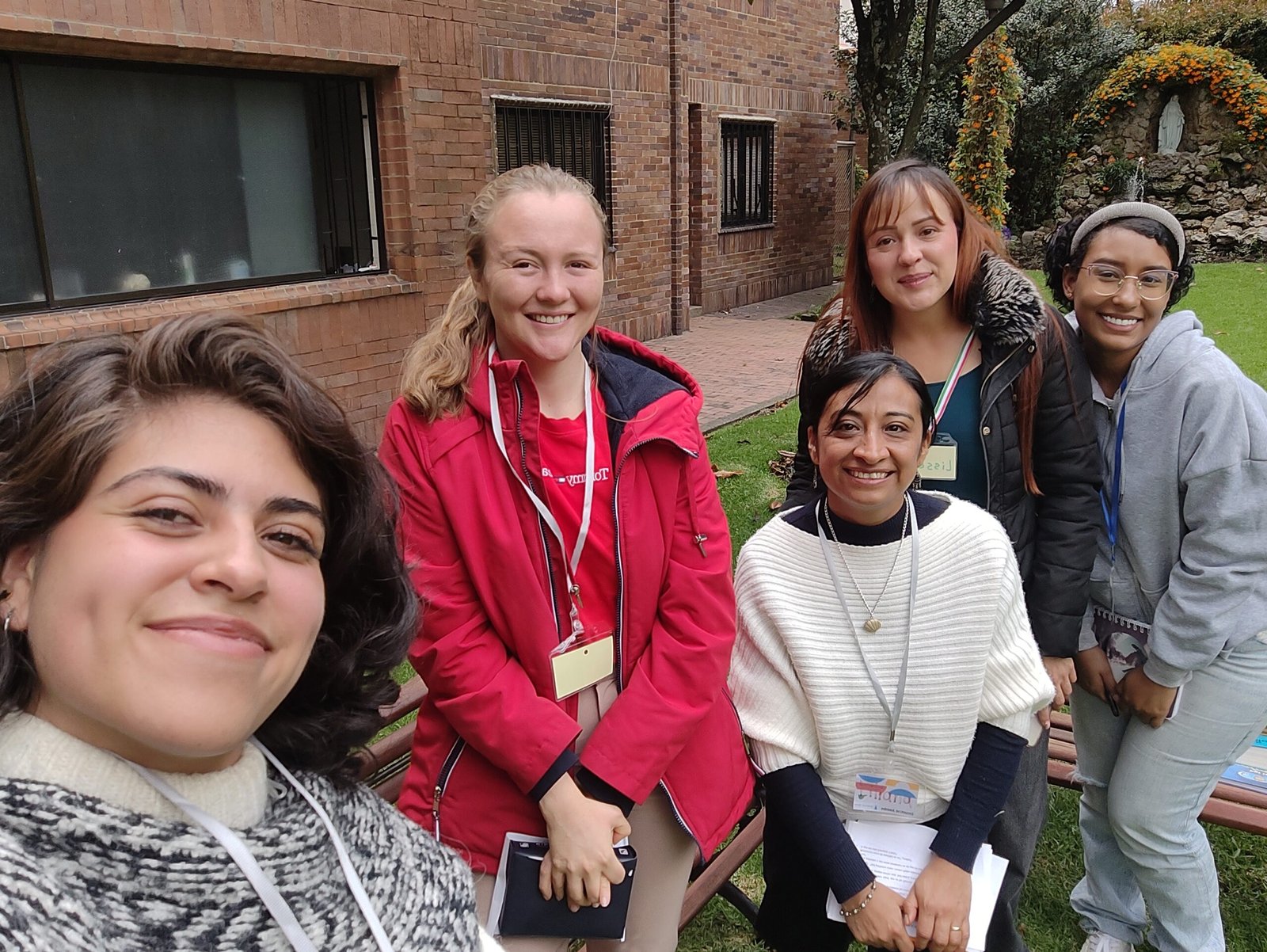
Gospel according to Saint Matthew 22,1-14:
Jesus went on speaking to the chief priests and elders in parables: «This story throws light on the kingdom of heaven. A king celebrated the wedding of his son. He sent his servants to call the invited guests to the wedding feast, but the guests refused to come. Again he sent other servants ordering them to say to the invited guests: ‘I have prepared a banquet, slaughtered my fattened calves and other animals, and now everything is ready; come then, to the wedding feast’.
»But they paid no attention and went away, some to their fields, and others to their work. While the rest seized the servants of the king, insulted them and killed them. The king became angry. He sent his troops to destroy those murderers and burn their city.
»Then he said to his servants: ‘The wedding banquet is prepared, but the invited guests were not worthy. Go, then, to the crossroads and invite everyone you find to the wedding feast’. The servants went out at once into the streets and gathered everyone they found, good and bad alike, so that the hall was filled with guests.
»The king came in to see those who were at table, and he noticed a man not wearing the festal garment. So he said to him: ‘Friend, how did you get in without the wedding garment?’. But the man remained silent. So the king said to his servants: ‘Bind his hands and feet and throw him into the dark where there is weeping and gnashing of teeth’. Know that many are called, but few are chosen».
Fast food and royal banquets
Luis CASASUS President of the Idente Missionaries
Rome, October 15, 2023 | XXVIII Sunday in Ordinary Time
Isa 25:6-10a; Fil 4:12-14.19-20; Mt 22:1-14
After listening in recent Sundays to the three parables where Christ compares the kingdom of heaven to a vineyard, today He offers us the image, quite different, of a wedding banquet.
Perhaps one of his intentions is to help us overcome our fear of responding to his invitation, to make us see that He is not calling us to something boring or simply obligatory; a wedding banquet has the purpose of sharing the joy of a transcendental event in the life of the newlyweds. That is what banquets, or simply everyday family meals, are for. Even in these times, when haste makes us eat in a hurry.
A few days ago, on a flight from America to Europe, I offered a piece of chewing gum to a lady who was next to me and, although we had not spoken until then, she told me in detail the reason for her trip, to take care of her first newborn granddaughter, since her daughter was not in good health. This is how it happens in more or less formal meals and we cannot forget how Christ chose the Last Supper to say goodbye to his own and to institute the Eucharist and the Priesthood.
Banquets are not always attended with satisfaction, for various reasons, just as many children and adults are reluctant to attend Mass, either because they find it boring or because they have other plans. Of course, Christ made full use of the fact that eating with some people was a statement that you felt attached to them, so in the story of Zacchaeus, the crowd objected to Jesus eating with a hated and corrupt tax collector: All the people saw this and began to murmur: He has gone to be a guest of a sinner (Lk 19:7).
We need not recall that Jesus began his public ministry at a wedding feast in Cana.
But this is the unitive power of eating together, of breaking bread with someone, as can be seen in the Old Testament. An example:
Meanwhile, Abimelek had come to him from Gerar, with Ahuzzath his personal adviser and Phicol the commander of his forces. Isaac asked them, “Why have you come to me, since you were hostile to me and sent me away?”
They answered, “We saw clearly that the Lord was with you; so we said, ‘There ought to be a sworn agreement between us’—between us and you. Let us make a treaty with you that you will do us no harm, just as we did not harm you but always treated you well and sent you away peacefully. And now you are blessed by the Lord.”
Isaac then made a feast for them, and they ate and drank. Early the next morning the men swore an oath to each other. Then Isaac sent them on their way, and they went away peacefully.
—ooOoo—
As with the three parables of the vineyard, we should not think of them as reflecting “special moments,” but as something that happens every moment of our lives. It is not a metaphor for a vocation to the consecrated life or a memorable conversion that can happen once in our lives, as was the case with Zacchaeus.
Nor is it a feast like the one announced by the Teachers of the Law, which would be a kind of distant consolation for the tribulations of our present existence.
It is the permanent invitation of the Holy Spirit, which manifests itself in our life in many ways, but above all in Inspiration.
This is a word that has been used in the field of art and in the spiritual life, but it was Fernando Rielo who reminded us that the term “inspire” has a physiological meaning, something that our lungs must do continuously, in the same way that it is highly advisable to eat every day, although unfortunately there are too many people who cannot do it.
Today’s parable is a powerful allegory of Inspiration, which is not something we do, but a real invitation, made with the softness and naturalness of healthy lungs that take in the necessary air. Let us insist that these “lungs” are those of the Holy Spirit, not ours. We are inhaled just as the guests at the banquet are called with delicate insistence.
What does this Inspiration mean? The invitation to continually do small things, small gestures, small changes in our lives, small signs of forgiveness, small acts of generosity, like the eight-year-old girl, born without arms or legs, who, holding a spoon in her mouth, fed other smaller children in a home of Mother Teresa’s sisters in Baghdad (reported by T. Radcliffe, OCT 1, 2023).
I would like to cite a very different example of what we heard about in Rome a few days ago. It is the case of a young man with a high-level job in Paris, who was invited to one of the most expensive and prestigious restaurants in the city. At the end of dinner, he is approached by a young woman who asks him to invite her to spend the night in his apartment, for a certain amount of money. He begins to talk to her, becomes interested in her life plans and convinces her to accompany him…to an office where they were looking for a young female worker. She accepts the invitation and… gets the job and freedom from prostitution.
The Inspiration of the Holy Spirit shows us that we are not alone, for God continually touches our hearts to bring us out of our lonely and somewhat uncomfortable cave, but it is the place we choose to torture ourselves with our misfortunes… or to throw stones at others.
But we are dominated by the fear of letting ourselves be loved, as Pope Francis said; we know that being loved pushes us strongly to respond with the same love and this is not an exaggeration, for Christ himself assures us that we will be able to do greater things than He did. It seems contradictory, doesn’t it? Because before we remembered that we can only do small things; but what the Potter does with us… is something else.
So I went down to the potter’s house, and I saw him working at the wheel. But the pot he was shaping from the clay was marred in his hands; so the potter formed it into another pot, shaping it as seemed best to him (Jer 18: 3-4).
—ooOoo—
Another essential aspect in the parable is that everyone is invited. This was clearly countercultural; it is evident that Jesus wanted and wants to make an impact on our consciences and our customs. Let us keep in mind that it is a king who organizes the banquet in the parable. The kings invited (just as they do today, as Presidents or Prime Ministers) the people with whom they wished to establish alliances, or those who had helped them to defeat enemies.
The servants did not imagine, nor do we, that God the Father wishes to invite the mediocre, those who fulfill the commandments out of fear, those who begin with generosity and end up falling into shameful acts… you and I are in those groups, are we not? It is not enough to recognize it with apparent humility, but to commit ourselves, just at the moment when we have just sinned, or looked the other way when we could have helped in a small task, or simply with our company.
I apologize for speaking of my own experience, but it is something that has touched me deeply and illustrates well what God does with those little things we do for Him. A few days ago, I was told that a person, now 66 years old, whom I knew when we were both in school, was suffering from advanced pancreatic cancer with a poor prognosis. We have met only twice in all these years, but I wrote him a short note and this is his reply:
Thank you, friend, for your words that support me so much in these hard times. Memories come to me.
These days I have my daughters and my granddaughter, who are the best therapy, and next week I hope to start chemotherapy. Let’s be confident. We have already picked almonds in Bolea and a good harvest of olives is coming. Count on a little bottle of oil. I feel you close to me, in my heart, you are good medicine.
God’s mercy is, above all, his presence. And we have to be apprentices of that form of presence, of that way of accompanying others that becomes medicine by the art and will of the Holy Spirit.
The banquet of the kingdom of heaven is a state of joy. Emotions, even the most shocking ones, pass, but beyond life and death, there remains the intimate certainty announced in the First Reading and confirmed by St. Paul:
When the perishable has been clothed with the imperishable, and the mortal with immortality, then the saying that is written will come true: “Death has been swallowed up in victory.” Where, O death, is your victory? Where, O death, is your sting?” (1Cor 15: 54-55).
It is the same message with which he ends his Epistle to the Philippians and which we hear today in the Second Reading:
My God, for his part, with his infinite riches, will remedy with magnificence all your needs, through Christ Jesus. Glory be to God our Father forever and ever. Amen.
—ooOoo—
The last part of the parable is terrifying. St. Matthew uses the whole arsenal of expressions that could move the Jews, to whom he addresses his Gospel: fire, darkness, trembling, gnashing of teeth… It was the language the Israelites knew, having heard it from their preachers. We know that this is not literally the vengeful intention of a God who is Father, but the message is clear: the seriousness of not accepting the meaning of the privilege of Baptism, represented by the vestments.
We are called to put ALL the means at our disposal; otherwise, only our good qualities will be visible from time to time, but we will deprive others of feeling the presence of God in our life, which is manifested by a permanent, continuous change, impossible to explain without divine grace. That is, it should be, the effect of our white garment.
_______________________________
In the Sacred Hearts of Jesus, Mary and Joseph,
Luis CASASUS
President











